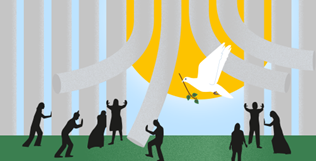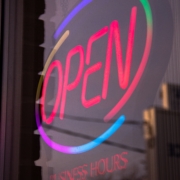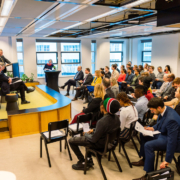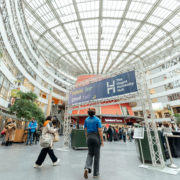International Alert releases new report ‘The Gender Trap’: demonstrating how patriarchal norms and cultural expectations limit peacebuilding in diverse settings
By Thomas Ansell
The international peacebuilding organisation and member at The Hague Humanity Hub, International Alert, launched its new report at an event at Amare on 12 May 2023. We took a look into the report to pinpoint the multiple ways in which patriarchal expectation hamper peacebuilding, typically in spite of many woman-led efforts around the world. Authors Ndeye Sow and Swechchha Dahal took a holistic approach to the subject, taken from the work on International Alert’s programme ‘Addressing Patriarchal Gender Norms and the Social Constructions of Masculinities in Conflict Settings’ – which was run in countries including the Philippines, Nigeria, Nepal; and Kyrgyzstan. Throughout the report, the authors look to find ways to include gender-sensitive peacebuilding in future work.
The full report is available to read here, and if you’d like to look further into the role of gender equality and peacebuilding, check out our summary of and insights from the peace&justice café: Towards Gender Justice, organised by The Hague Humanity Hub in 2022, here and here.
How do culture and inequality combine to form challenges for peacebuilders to address?
As noted by the reports authors, masculine and feminine norms are built up over many years and generations, and are interwoven with other cultural considerations. These combine to limit the agency of women in many situations, for example in the Philippines the Bangsamoro tribal/religious system emphasises women’s role within the domestic sphere, leaving external work to the men: “Here, femininity and womanhood are closely associated with motherhood and the fulfilment of a reproductive role, while the hegemonic masculine figure appears to be the ‘provider’ of the family.”
This is not to say that women’s agency in the countries considered is zero, say the authors: “Women do have power within patriarchal systems, but over specific, limited decisions, for example, around childcare and household chores. … Women therefore need to be a significant part of the solution and must be considered as actors with power…. Alert’s research found that women-run networks are the most effective tool to create gender equality”. The report also notes that notions of ‘honour’ very much colour perceptions of the roles that men and women can play: which can lead to women self-disciplining in line with existing norms, and therefore limiting their role and agency.
Language issues, too, contribute to maintaining existing (and problematic) norms. For example, in Kyrgyzstan, mainly English-language terms were found to be used across gender equality campaigns. This has had the unintended effect of ‘othering’ these campaigns (and gender equality more widely) as ‘Western imports’, that are incompatible with Kyrgyz culture. International Alert’s team in the region worked to find a new lexicon for equality rooted in local culture, drastically improving the effectiveness of the campaign.
Addressing Sexual and Gender-Based Violence (SGBV)
A peaceful society, fairly self-evidently, should be free of Sexual and Gender-Based Violence. However, as identified in the report, gender and patriarchal norms very much hamper attempts to address, report, and limit SGBV. Take, for example, approaches to limiting violence in Nigeria: “In Nigeria’s Bauchi state, progressive legal acts and actions are being hindered by the domination of courts by male judges. The Bauchi state adopted the Violence Against Persons Prohibition (VAPP) Act10 and Nigeria security and civil defence corps in Bauchi established an all-female squad to address increasing cases of rape, kidnapping and other security issues affecting women. Most cases of GBV, however, such as marital issues, rape and family disputes, continue to be addressed by the Sharia courts, which are dominated by male judges.”
Furthermore, embedded gender norms seem to have ossified attempts by advocacy groups to improve the situation: mainly because these attempts have been successful in recruiting women to their cause, but these women almost always are limited to the administrative department of the Sharia court system. In the Philippines, similarly, gender norms have prevented SGBV being discussed in formal peace talks.
An important reminder of the intersectionality of issues comes from International Alert’s work in Nepal. A 24-hour SGBV helpline was set up in Nepal, however it tends only to serve women from the highest classes (or castes) in Nepali society; with a huge access issue stemming from the most vulnerable in society not being able to get access to a phone.
Looking towards solutions
A gender-sensitive approach to peacebuilding, say the reports authors, “needs strategic alliance building at its centre”. This includes engaging with elements of the dominant (and often patriarchal) culture: “For example, in Kyrgyzstan, the role of religious leaders was emphasised by all respondents [to a survey], due to their key role in the communities and the significant contribution they can make in the prevention of violence at the local level, such as by helping men to overcome alcohol abuse.” International Alert’s work in Nigeria and the Philippines has also looked to interface with traditional power structures to educate men in power about women’s role in peacebuilding, and to coax these men to provide a positive input in the future.
The need for local sensitivity in peacebuilding approaches is also highly important, says Alert. Kyrgyzstan was a particularly difficult place to work for advocates of gender equality, not least for the practical reason that in a majority-Muslim country it is unseemly to have men and women in the same groups discussing challenges and potential solutions. The local team decided to split participants into male and female groups, therefore making a more comfortable and open environment that allowed participants to really express themselves.
The report also cautions towards numerical targets masquerading as real progress: in Nepal a quota system ensured huge growth in the number of women elected in municipal elections. However, the report notes, this hasn’t translated into a large boost for gender equality in the country: with a secondary issue that whilst plenty of women have been elected, the vast majority do not occupy positions of great power (and those that do are most often from the higher classes and castes).









